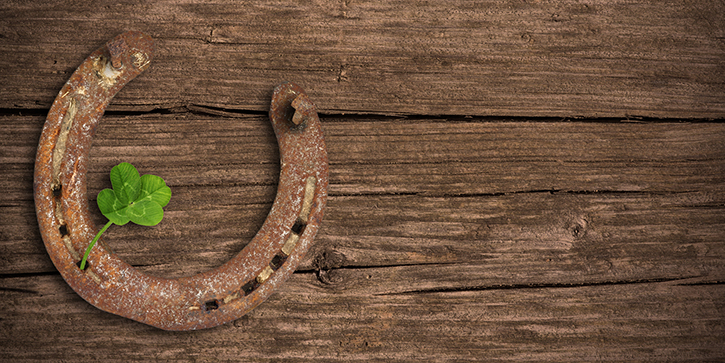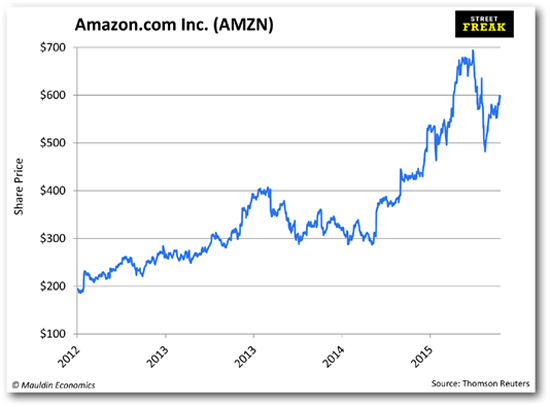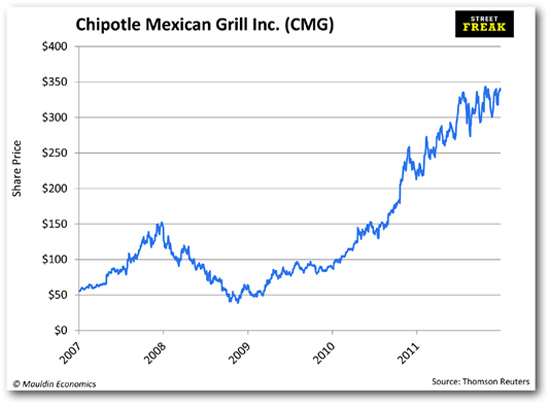
Better Lucky Than Good
-
 Jared Dillian
Jared Dillian
- |
- June 23, 2016
- |
- Comments
I am the luckiest person in the world.
No, really, I am not kidding.
I met a girl when I was 15 years old… and we are still together today. In August, we will have been married 19 years.
I got accepted to the Coast Guard Academy, back in 1992, when they had a 4% acceptance rate.
I got my first trading job because I almost got hit with a flying water bottle. Pure chance.
That set me up to get a job at Lehman Brothers, which was really a one-in-a-million shot, coming from a non-target school. Impossible odds.
I was at the World Trade Center during 9/11 and survived. I’d been in Windows on the World—a complex of venues at the top floors of Building One—just two weeks before.
I got my index arbitrage seat at Lehman by pure chance—met a guy in the elevator bank.
There were nine new associates in the Equities Division. After a few years, just one: me.
I got picked to run the ETF desk; I didn’t ask for the job.
I started writing market commentary on Bloomberg. One of my readers was friends with a literary agent. The literary agent came to me about writing a book on Lehman Brothers. It wasn’t my idea! Millions of people try to get books published and can’t. I got one published by accident.
That book I wrote by accident was named the number one general business book of the year by Businessweek.
There was also the time a car carrier T-boned the NJ Transit bus I was in… and hit the seat in front of me.
And finally, most recently, my flight from Myrtle Beach to Atlanta was struck by lightning, started leaking fuel, and had to make an emergency landing. Was it scary? Not really. Did I think I punched my ticket? I thought there was a good chance.
There is also a bunch of other lucky stuff that is too personal to talk about here.
Like what you're reading?
Get this free newsletter in your inbox every Thursday! Read our privacy policy here.
I am so lucky, it is unnatural. Nobody is this lucky.
In my new novel, All the Evil of This World, I actually explore this concept, philosophically speaking. At times I have felt like I am so lucky, it is downright unfair.
When I was trading at Lehman Brothers, I had the occasional error, but I always made money on my errors!
I occasionally had to interview college kids for jobs. I really only had one question for them: “Are you lucky?”
It’s an interesting question. I’m not asking, “Do you think you are lucky?” I’m asking, “Are you lucky?” which is different. Existentially speaking, are you a lucky person?
- I don’t want to hire someone who is unlucky, if there is such a thing.
- I certainly don’t want to hire someone who thinks they are unlucky, because thoughts become actions.
- I don’t even really want to hire someone who thinks they are lucky. I want to hire someone who believes that there is such a thing as luck, and they have been blessed by it. I don’t want them to even question it.
They used to say about Dick Fuld, Lehman’s CEO: “If you are standing behind that guy in line to buy a lottery ticket, best to give him your dollar, because that son-of-a-bitch is going to win.”
Every time I am with my wife at a raffle, she always says, “I never win anything.” That’s true, you never win anything!
I have plenty of money, but I buy lottery tickets all the time. I really believe that I am going to win, it is just a matter of time. Nice thing about South Carolina: if you win the lottery here, you can remain anonymous. So if I suddenly don’t show up to write Street Freak one month, you know what happened.
My wife disagrees with me on this. She says, “You make your own luck.”
There is some truth in that. I never would have gotten almost hit by that water bottle if I hadn’t gone to the exchange floor in the first place. I wouldn’t have gotten that job at Lehman if I didn’t do all that hustling. But lots of people hustle, and nothing good happens to them. I am lucky.
I have a lot of theories about this. I hate to be unscientific, but I really do believe that your attitude shapes everything that happens to you in life. If you wish for good things, you get good things. If you secretly wish for bad things, you get bad things.
I like reading studies on longevity. The people who live past the age of 100 are generally pretty positive people.
In The Daily Dirtnap, I talk a lot about the role of luck in investing. Investing is one of those things where even if you have the right idea, you can lose money if you are unlucky.
Take Amazon, for instance:

It’s a bull market in Amazon, but you could still lose money if you were unlucky. You could have bought at 400 and sold at 300, on the correction.
Like what you're reading?
Get this free newsletter in your inbox every Thursday! Read our privacy policy here.
Lucky people make money when they aren’t supposed to. I made money being short CMG in 2008, probably the only one to do so.

There is this whole argument that fund managers only beat the S&P 500 because they are lucky, that it will catch up with them eventually.
Look at Bill Miller: 15 years of beating the S&P 500, then he blew himself up.
The way people talk, you’d think that luck was responsible for his success but stupidity was responsible for his failure. But you can’t have it both ways.
He likely beat the index for all those years because of skill, because he was used to a certain market environment. Then the environment changed, and he didn’t.
There is a property of markets called nonstationarity—it is a game whose rules are constantly changing. Most people can figure out how to make money in one set of rules, but when the rules change, they are screwed.
For sure, luck plays a role. But when you take a guy like Stanley Druckenmiller, who didn’t have a losing year in 25 years of running money—and then call him a coin flipper (as Marc Andreessen calls investors on Twitter), that’s just nonsense.
I can help you with some trade ideas, but if you want to get better as an investor, the first thing you can do (that takes no effort at all) is to believe you are lucky.
When I put on a trade, I expect it to be a winner. I don’t even consider the possibility that it won’t be. I am always surprised when trades lose money. I take the loss and move on and put on the next trade—which I believe will be a winner.
I don’t put on trades hoping that they’ll be winners. I know that they will.
The definition of lucky: good things happen to you by chance more than they happen to other people.
Does that define you? I sure hope so.
subscribers@mauldineconomics.com

 Jared Dillian
Jared Dillian